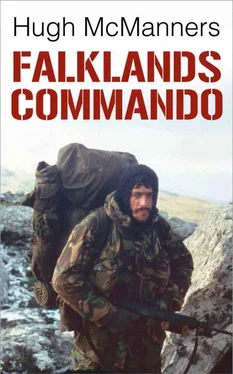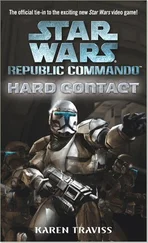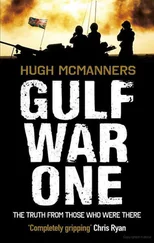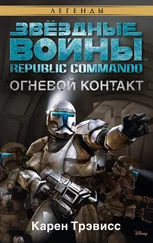Hugh McManners - Falklands Commando
Здесь есть возможность читать онлайн «Hugh McManners - Falklands Commando» весь текст электронной книги совершенно бесплатно (целиком полную версию без сокращений). В некоторых случаях можно слушать аудио, скачать через торрент в формате fb2 и присутствует краткое содержание. Город: London, Год выпуска: 2014, ISBN: 2014, Издательство: Nightstrike Publishing, Жанр: nonf_military, Биографии и Мемуары, на английском языке. Описание произведения, (предисловие) а так же отзывы посетителей доступны на портале библиотеки ЛибКат.
- Название:Falklands Commando
- Автор:
- Издательство:Nightstrike Publishing
- Жанр:
- Год:2014
- Город:London
- ISBN:978-0-992-81540-0
- Рейтинг книги:4 / 5. Голосов: 1
-
Избранное:Добавить в избранное
- Отзывы:
-
Ваша оценка:
- 80
- 1
- 2
- 3
- 4
- 5
Falklands Commando: краткое содержание, описание и аннотация
Предлагаем к чтению аннотацию, описание, краткое содержание или предисловие (зависит от того, что написал сам автор книги «Falklands Commando»). Если вы не нашли необходимую информацию о книге — напишите в комментариях, мы постараемся отыскать её.
Falklands Commando — читать онлайн бесплатно полную книгу (весь текст) целиком
Ниже представлен текст книги, разбитый по страницам. Система сохранения места последней прочитанной страницы, позволяет с удобством читать онлайн бесплатно книгу «Falklands Commando», без необходимости каждый раз заново искать на чём Вы остановились. Поставьте закладку, и сможете в любой момент перейти на страницу, на которой закончили чтение.
Интервал:
Закладка:
A white flag appeared from a group at the bushes halfway up the hill, and a group of men started to walk down towards us. The four that arrived first were very young, uneducated and poorly equipped. Rod questioned them and said that he was very glad his Spanish wasn’t as bad as theirs. Their boots had holes and they had one blanket each. They said they’d been flown in a few days previously and had no food except a sheep they’d killed. They said their sergeant and officer had gone off earlier. They also said that their group had several casualties.
A section was sent down the hill to search for enemy wounded – another unsafe thing to do in view of the numbers of enemy that had disappeared in this area, but again our logic was still humanitarian rather than military. They found four casualties suffering from bad gunshot wounds, who were made as comfortable as could be managed with morphine and dressings. They were later flown out to a British hospital ship. This search was a very lengthy process, and thankfully there was no more firing from whoever remained at large from the heavy-weapons company.
It was now completely light, and turning into a beautifully crisp, clear day – ideal for the Argentine Air Force.
Our main landings were running very late, to the alarm of one of the SBS beach recce teams. They were lying in wait right beside an enemy position and didn’t know whether to attack it and risk the landing being delayed and themselves overwhelmed, or leave it there and have the beach rendered insecure. I tried to find out what was happening from our people in the Ops Room on Fearless , but they didn’t know – or wouldn’t say.
As it got light we could see ships in the Sound and in San Carlos Water. I flicked through the radio frequencies, and could tell from traffic that the landing-craft were going in. We tied white bandages round our heads like bandanas, the agreed recognition sign that would give us safe passage down through what would be the Parachute Regiment’s perimeter once they’d landed.
A British Scout helicopter clattered up from the shoreline, to land on our ridge. SBS commander Jonathan Thomson, a medical officer and two medics clambered out. Jonathan was grim and angry. He’d had been trying to rescue the two-man crew of a Gazelle helicopter that had been shot down by enemy in the Findlay Rocks area behind us. The helo had gone into the sea and the crew were swimming ashore when the Argies machine-gunned them, killing both.
Jonathan was uncharacteristically hard-faced, concerned to take our prisoners off our hands as fast as possible. Jonathan told me he now realised why military textbooks say it’s important for prisoners to be taken from their captors to the rear areas so quickly. The Argentine soldiers were flown to one of the ships.
The Squadron Sergeant Major, with all his operational experience, had been right. As this news went round the patrol, we resolved not to take so much trouble over surrenders, although also agreeing we were not going descend to the depths of killing for no purpose – as these Argentinians seemed to have done.
Despite all this, the rising run was now warming through my layers of chilled clothing, on the clearest, most beautiful day. As I was spading into the rocky ground to deepen my shell scrape, I began thinking this whole thing bizarrely identical to the various big NATO exercises we’d done so many times before.
But in that moment, the first Argentine Mirage jet screamed in from the north, 50 feet or so west and just below our position.
As it flashed through, I saw it was painted in air show colours – a gaudy camouflage in contrast to the oily, drab, green and black of our own Harriers. The underbelly was white with red-and- green stripes, and the pilot wore a white helmet with black sun visor.
The second of this first pair flashed through, both too quickly for any action on our part. They were using the narrow gap between the Head and our ridge as a screen from the missiles now being fired from the fleet down in San Carlos Water. We positioned our phalanx of GPMGs to put a hail of lead into the path of the next batch.
Down in the anchorage, Canberra , huge and white, stationary in the water, seemed the most impossibly easy target. The two LPDs (Landing Platform Dock: Fearless and Intrepid ) also looked very vulnerable, as the destroyers and missile frigates steamed urgently into their positions as air defending ‘goal-keepers’.
More Argentine jets appeared out of the clear air. Their desperate, low-level twisting and turning, and the roar and explosion of the Sea Cat and Sea Wolf missiles were too far away to be more than just background noises. We saw smoke billowing from the stern of Ardent, where we later learned our liaison officer Captain Bob Harmes was fire-fighting prior to his first sinking, and heard confusing reports over the radio of which ships had been hit.
These first air raids were strange and surreal, as we sat in the bright, clear sunlight on that wind-swept hill.
With the prisoners taken off our hands, we shouldered our kit and set off down the ridge to the eastern side of Partridge Valley. We moved down through the brilliant green and brown heather in a large diamond formation with one section forward, each section moving as an arrowhead spread out over a very wide area to minimise the number of people who could be hit at once in any sort of attack.
We were still nervous about any Argies who might still be alive and roaming around, but more so about entering 3 Para’s area, and any trigger-happy paratroopers who might have forgotten we were coming. With our long hair and combat waistcoats, we didn’t look terribly British.
After cutting back up a ridge we descended to a sandy beach on the west side of Fanning Harbour, to meet the LCM (Landing Craft Medium [4]) that would take us back to Intrepid . We gained the shelter of the cove just before the second wave of Argentine air attacks swept in. This time, the radars on the ‘flat tops’ (carriers Hermes and Invincible ) gave good early warning to the landing-force. [5]The enemy jets had to fight their way through the Harriers’ Combat Air Patrol (known as the ‘CAP’), which reported their direction to the landing force ships, which we were able to pick up on our radio net.
Knowing the approach bearing and ETA of the next air raid allowed us to arrange our GPMGs so as to put up a screen of lead through which any aircraft that flew over our heads would have to fly. A lookout was positioned on the hill in the direction of the attack, with the ‘curtain of lead’ organised to be fired upwards from 100 metres further along the beach. As soon as the lookout saw the aircraft he would raise his arms and we would open fire into the air above our heads. The 100 metres distance would give the rounds time to get up to the jets before they flashed overhead at speeds of up to 675 mph. [6]
As soon as we’d taken up our positions, another air raid came screaming in: four Argentine jets sliced down through the fleet flying very, very low, at least two were Mirages. Having dropped their bombs, they screamed directly over our quiet cove running for the cover of Fanning Head and home. This took them right through our lead curtain.
As they flashed away over the scree slope at the end of the beach, bits flicked off the tail of one of the Mirages and brown smoke started to come out of its side. All four vanished from sight, and it’s impossible to say for certain whether the explosion we heard was the Mirage hitting the water, but he certainly wasn’t going to make it back to Argentina.
There were shouts of congratulation, then expletives as our little cove was suddenly filled with explosions, and we took cover. This seemed rather mysterious, until I realised that with every weapon in San Carlos Water firing in the direction of these four jets, and them vanishing northwards over our heads, the missile and gun operators would be aiming towards us. So when the rockets ran out of fuel or the operators lost sight of the target, the missiles were hitting our beach and the cliffs at the end.
Читать дальшеИнтервал:
Закладка:
Похожие книги на «Falklands Commando»
Представляем Вашему вниманию похожие книги на «Falklands Commando» списком для выбора. Мы отобрали схожую по названию и смыслу литературу в надежде предоставить читателям больше вариантов отыскать новые, интересные, ещё непрочитанные произведения.
Обсуждение, отзывы о книге «Falklands Commando» и просто собственные мнения читателей. Оставьте ваши комментарии, напишите, что Вы думаете о произведении, его смысле или главных героях. Укажите что конкретно понравилось, а что нет, и почему Вы так считаете.












